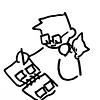You need to sign in or sign up before continuing.
Take a photo of a barcode or cover
slow-paced
informative
reflective
slow-paced
challenging
informative
slow-paced
informative
reflective
slow-paced
Positives: I'm really glad I read this because it was both easy to read and informative. I love when pop science authors integrate their personal histories with the science, and I think Page does this really well. The primary questions that Page poses based on his research - is giving kids stimulants safe and effective? do stimulants work in the long term? what is the role of class and trauma in ADHD or ADHD-like behavior? - are all related to his own story. I would recommend this for anyone who thinks they might have ADHD or who's newly diagnosed, or who is considering stimulants (Adderall/Ritalin) for the first time.
Negatives: Page has "white guy with ADHD" handwriting, which isn't his fault, but the book is not that large, so the text is difficult to read, especially for extended periods. He should have hired someone else to do the lettering. His comic style is also not super original - it's mostly a 3x3 grid of panels with text at the top and a descriptive doodle or joke underneath. This book is REALLY long though for a graphic novel, so adding more complex layouts or color would have taken much much more work. It's more important that he spent time on his research.
Also, there's some pretty egregious and unnecessary fatphobia throughout. This shows up as:
- Page discussing his own intentional weight loss, including numbers
- Encouraging people with ADHD to try "healthy diet" and frequent exercise as a treatment, which makes sense, but he doesn't really acknowledge that (a) what a "healthy diet" is is totally different depending on who you ask and public understanding of "healthy diet" changes from decade to decade, and (b) that lots of people can't exercise that frequently for various reasons, including disability
- using "resisting unhealthy food" as a frequent metaphor for behavioral inhibition/disinhibition
- drawing fat characters to convey that they are lazy or unhealthy - for example, a doodle of a fat person in an easy chair labeled "USA" to convey that the US is resistant to change
Semi-related, at one point he describes classic binge eating behavior in his teens without ever describing it as "binge eating" - even though he mentions binge eating disorder later in the book, unrelated to his own story. That struck me as weird
Negatives: Page has "white guy with ADHD" handwriting, which isn't his fault, but the book is not that large, so the text is difficult to read, especially for extended periods. He should have hired someone else to do the lettering. His comic style is also not super original - it's mostly a 3x3 grid of panels with text at the top and a descriptive doodle or joke underneath. This book is REALLY long though for a graphic novel, so adding more complex layouts or color would have taken much much more work. It's more important that he spent time on his research.
Also, there's some pretty egregious and unnecessary fatphobia throughout. This shows up as:
- Page discussing his own intentional weight loss, including numbers
- Encouraging people with ADHD to try "healthy diet" and frequent exercise as a treatment, which makes sense, but he doesn't really acknowledge that (a) what a "healthy diet" is is totally different depending on who you ask and public understanding of "healthy diet" changes from decade to decade, and (b) that lots of people can't exercise that frequently for various reasons, including disability
- using "resisting unhealthy food" as a frequent metaphor for behavioral inhibition/disinhibition
- drawing fat characters to convey that they are lazy or unhealthy - for example, a doodle of a fat person in an easy chair labeled "USA" to convey that the US is resistant to change
Semi-related, at one point he describes classic binge eating behavior in his teens without ever describing it as "binge eating" - even though he mentions binge eating disorder later in the book, unrelated to his own story. That struck me as weird
Graphic: Domestic abuse, Fatphobia
This book was far more technical than what I had counted on. Actually, I am pretty sure I didn't understand half of it. But for any layman or - woman who really wants to go into detail understanding the history and development of our understanding and treatment of ADHD, this is a thorough and honest guide, and you can just read the details slower than I did.
The biggest virtue is the meticulous nuancing of the many questions that are often inexperetedly being discussed in public, like "Is ADHD an actually existing condition" and "Is medicine just drugs that turn kids into obedient zombies".
If like me, you find science in the book it is more than you can digest, you can read the personal story of Tyler Page and just skim the details of brain functions, medicine, and diagnostics.
The central message of the book is (thank God, I should say) more relevant in the US than in Denmark, where I live, since combining behavioral methods with medicine is already the standard approach here. (Though, alas, not always followed as much as it ought to be.) Of course it also helps that we have universal healthcare, so that the the golden calf of capitalism is not the sole master here.
Profits is the worst guide in important decisions about people's health.
Tyler has (as a typical ADHDer) been *very* thorough and wanted has chosen to let the many, many words of the book present themselves in very, very small letters. I recommend a good reading lamp, and if you sometime use reading glasses, find them and use them. Page obviously just didn't want to leave out any facts.
challenging
informative
slow-paced



